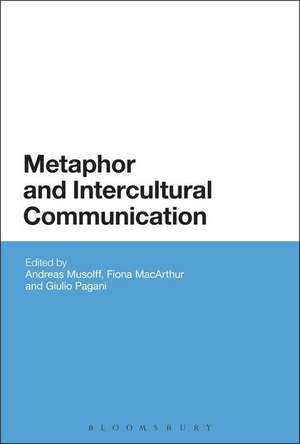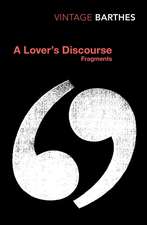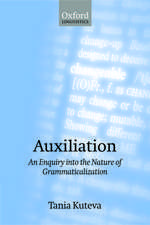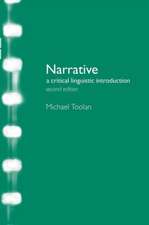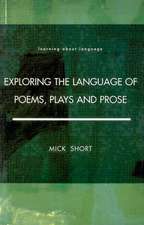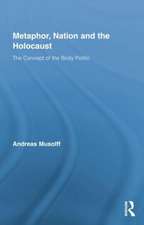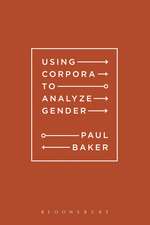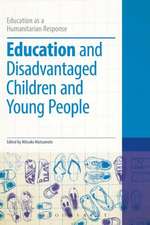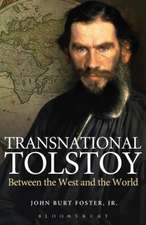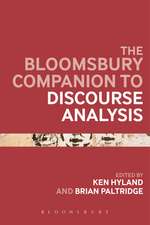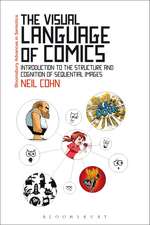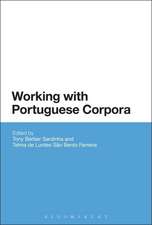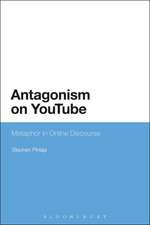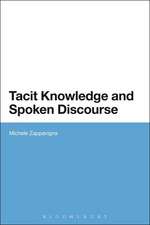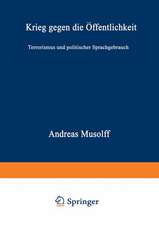Metaphor and Intercultural Communication
Editat de Professor Andreas Musolff, Fiona MacArthur, Giulio Paganien Limba Engleză Hardback – 9 apr 2014
| Toate formatele și edițiile | Preț | Express |
|---|---|---|
| Paperback (1) | 257.32 lei 6-8 săpt. | |
| Bloomsbury Publishing – 21 oct 2015 | 257.32 lei 6-8 săpt. | |
| Hardback (1) | 775.02 lei 6-8 săpt. | |
| Bloomsbury Publishing – 9 apr 2014 | 775.02 lei 6-8 săpt. |
Preț: 775.02 lei
Preț vechi: 1113.63 lei
-30% Nou
Puncte Express: 1163
Preț estimativ în valută:
148.30€ • 154.84$ • 122.74£
148.30€ • 154.84$ • 122.74£
Carte tipărită la comandă
Livrare economică 05-19 aprilie
Preluare comenzi: 021 569.72.76
Specificații
ISBN-13: 9781441165473
ISBN-10: 1441165479
Pagini: 248
Dimensiuni: 156 x 234 x 25 mm
Greutate: 0.59 kg
Ediția:New.
Editura: Bloomsbury Publishing
Colecția Bloomsbury Academic
Locul publicării:London, United Kingdom
ISBN-10: 1441165479
Pagini: 248
Dimensiuni: 156 x 234 x 25 mm
Greutate: 0.59 kg
Ediția:New.
Editura: Bloomsbury Publishing
Colecția Bloomsbury Academic
Locul publicării:London, United Kingdom
Caracteristici
Concerns the fundamental tension between universalist classical cognitivism and variation-oriented research addressing relativity/specificity.
Notă biografică
Andreas Musolff is Professor of Intercultural Communication at the University of East Anglia, UK. Fiona MacArthur is a Senior Lecturer in the Department of English Philology at the University of Extremadura, Spain. Giulio Pagani is Lecturer in Discourse and European Politics at the University of East Anglia, UK
Cuprins
Preface, Zoltán Kövecses Introduction: metaphor in intercultural communication, Andreas Musolff, Fiona MacArthur & Giulio Pagani Part I: Metaphor in Translation 1. The evolution of translation trainees' subjective theories: an empirical study of metaphors about translation, Celia Martín de León & Marisa Presas 2. Translation of Metaphor in Popular Technology Discourse, Dafni Padadoudi 3. Revisiting the function of background information in sight translating metaphor: An analysis of translation product and process, Xia Xiang and Binghan Zheng 4. Conceptual metaphors in translation - A corpus based study on quantitative differences between translated and non-translated English, Claudia Förster-Hegrenæs Part II: Universal vs. Culture-Specific Aspects of Metaphor 5. Variation within universals: The 'metaphorical profile' approach to the study of anger concepts in English, Russian, and Spanish, Anna Ogarkova & Cristina Soriano 6. Conceptual metaphor in intercultural communication between speakers of Aboriginal English and Australian English, Farzad Sharifian 7. Cultural influence on the use of dogs in English and Kabyle proverbs, Sadia Belkhir Part III: Metaphor, Globalization and Intercultural Communication8. English idioms borrowed and reshaped: The emergence of a hybrid metaphor in Spanish, José L. Oncins-Martínez 9. 'Economic conquistadors conquer new worlds': Metaphor scenarios in English-language newspaper headlines on Spanish Foreign Direct Investment, Jasper Vandenberghe, Patrick Goethals and Geert Jacobs 10. One step forward, two steps back - Conceptualising the EU accession in Serbian and EU discourse, Nadezda Silaski and Tatjana Ðurovic 11."Metaphor and self/other representations: A study on British and Romanian headlines on migration", Mariana Neagu and Gabriela Iuliana Colipca-Ciobanu Index
Recenzii
The collection ... distinguishes itself by making a new effort to meet the challenge of investigating intercultural communication from the angle of metaphor by offering new theoretical concepts and new methodologies for analyzing metaphor in discourse ... Both students and professionals in the fields of metaphor studies and intercultural research could benefit from reading this volume.
The issues of metaphor and conceptualisation are excellently addressed and defined in every chapter of this book, giving the volume good coherence overall and allowing the reader to follow the trains of thought easily. An advantage of the book is that most papers are sufficiently accessible and succinct to be readable by a wide audience of both scholars and interested non-scholarly readers ... In all, the book presents a great collection of studies of metaphor and conceptualisation with implications for intercultural research.
The issues of metaphor and conceptualisation are excellently addressed and defined in every chapter of this book, giving the volume good coherence overall and allowing the reader to follow the trains of thought easily. An advantage of the book is that most papers are sufficiently accessible and succinct to be readable by a wide audience of both scholars and interested non-scholarly readers ... In all, the book presents a great collection of studies of metaphor and conceptualisation with implications for intercultural research.
